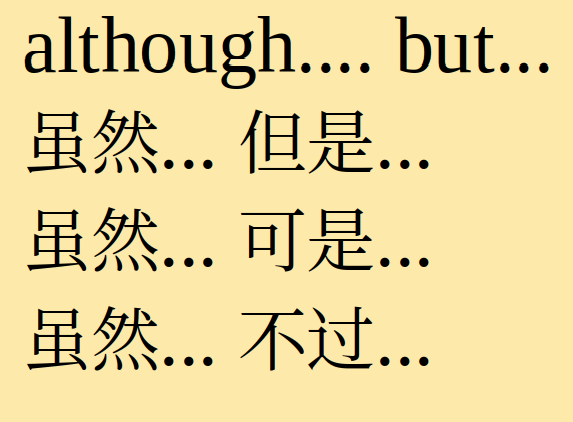In this post we look at 但是,可是,不过, which mean “but”, “however” or “while”
The pronunciation is as follows:
-
但 是 -
可 是 -
不 过
While all of these have a similar meaning, there are slight differences between them..
The basic sentence structure for using but”
although… but…
-
虽 然 ,。。。但 是 。。。 -
虽 然 ,。。。可 是 。。。 -
虽 然 ,。。。不 过 。。。
Alternatively, “although”
… but…
- 。。。
但 是 。。。 - 。。。
可 是 。。。 - 。。。
不 过 。。。
-
虽 然 。。。 -
虽 然 。。。 -
虽 然 。。。
Let’s look at some examples:
| although….. but…… | ….. but…… |
|---|---|
|
Although he has a job, but doesn’t have money |
He has a job, but doesn’t have money |
|
Although she is married, but wants a divorce |
She is married, but wants a divorce |
|
Although she doesn’t have experience, but is very smart |
She doesn’t have experience, but is very smart |
但是 (dànshì)
These are the main attributes of “但是”:
- Is often used in written Chinese.
- Interchangeable with
可 是 - Emphasises the second part of the sentence (clause) that follows
但 是 - Has a high degree of difference between the two parts of the sentence (clauses), for example:
- Example:
He has a job, but doesn’t have money有 工 作 , 但 是 没 有 钱
可是 (kěshì)
- Is often used in spoken Chinese.
- Interchangeable with
但 是 - Emphasises the second part of the sentence (clause) that follows
可 是 - Has a high degree of difference between the two parts of the sentence (clauses), for example:
- Example:
She is married, but wants a divorce她 结 婚 了 , 可 是 又 想 离 婚
不过 (bùguò)
- Is often used in spoken Chinese.
- Emphasises the second part of the sentence (clause) that follows
不 过 - Has a very high degree of difference between the two parts of the sentence (clauses), for example:
- Example:
She doesn’t have experience, but is very smart她 没 有 经 验 , 不 过 他 很 聪 明

